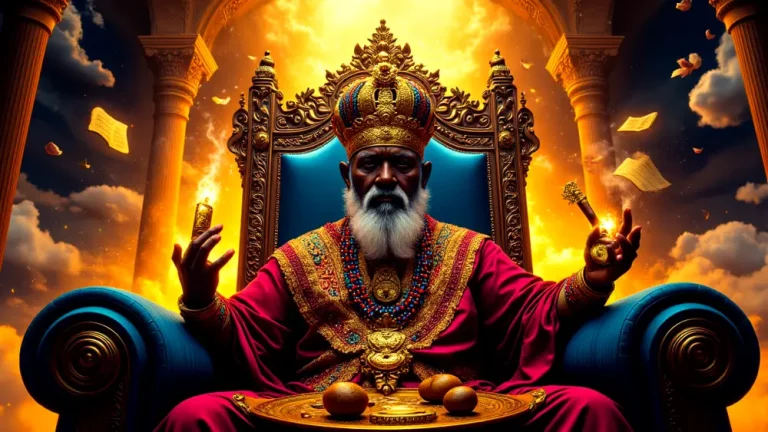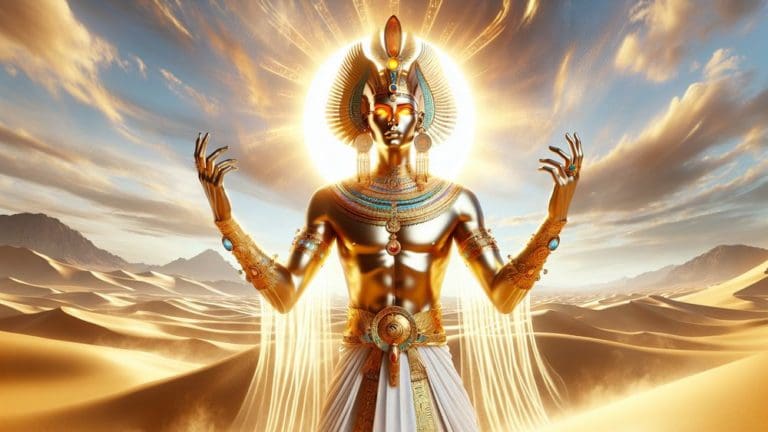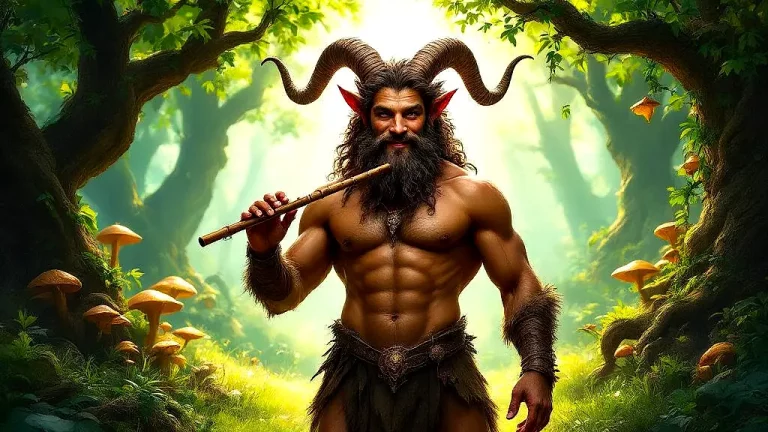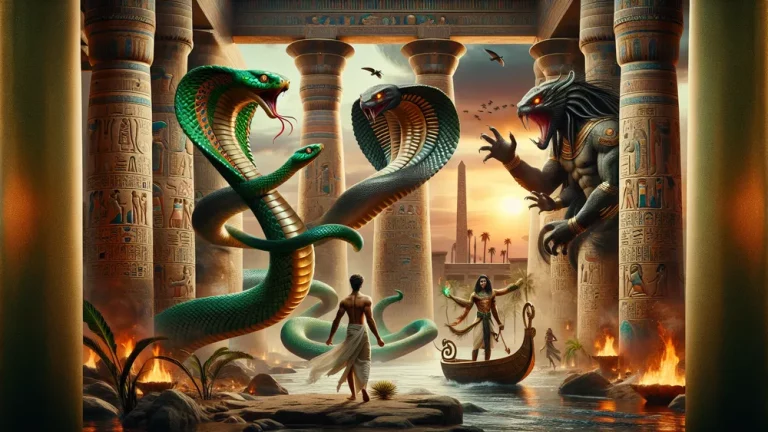153 Beautiful Greek Mythology Girl Names For Your Baby
Greek mythology has influenced names for thousands of years. Many of these names come from goddesses, heroines, and nymphs. You’ve probably read about Athena or Hera in books, but their origins go deeper. Some names come from gods, while others belong to mortal figures like Penelope, who was known for her loyalty in a famous story. The stories change depending on where you look.
Key Points:
- Greek mythology names come from goddesses, heroines, and nymphs, each with unique stories.
- Athena stands for wisdom and war, while Artemis is linked to hunting and wild places.
- Names like Penelope and Medea belong to mortal women known for loyalty and strong actions.
- Nymphs like Daphne and Echo represent nature, often appearing in myths about gods chasing them.
- Titans like Rhea and Theia were early gods controlling basic forces like light and memory.
- Lesser-known figures like Melinoe and Alectrona have niche roles but add depth to the myths.
- Epic tales give us names like Andromache and Circe, tied to famous stories from Homer’s poems.
Some say Athena was born fully armed from Zeus’s head, while others tell it differently. Still, their cultural impact is obvious. Today, these names still matter because they connect the past and present. Modern names like Arya or Khaleesi follow the same idea, just from newer tales. This guide covers 153 names, including Olympian goddesses, tragic heroines, nature spirits, and lesser-known figures.
Each one has a story. Artemis represents independence, and Daphne turned into a laurel tree. These stories could become part of yours.
Greek Mythology Girl Names: Overview and Key Facts
| Category | Key Figures | Domains and Traits | Mythological Significance | Modern Relevance |
|---|---|---|---|---|
| Olympian Goddesses | Athena, Hera, Artemis | Wisdom, marriage, wilderness | Athena helped heroes with battle strategies. Artemis guarded young women. | Athena ranks in the top 500 U.S. names (2023). |
| Heroines and Mortals | Penelope, Andromache, Medea | Loyalty, tragedy, magic | Penelope tricked her suitors by weaving and unweaving a shroud. Medea’s revenge became a famous tragic story. | Medea is a symbol of vengeance in literature. |
| Nymphs and Spirits | Daphne, Echo, Callirhoe | Nature (trees, echoes, springs) | To escape Apollo, Daphne turned into a laurel tree. Echo was cursed to only repeat sounds. | Daphne grew popular after Bridgerton. |
| Titans and Primordials | Rhea, Theia, Metis | Motherhood, light, wisdom | Rhea saved Zeus from being eaten. Metis was Zeus’s first wife. | Theia is the name of a moon of Saturn. |
| Lesser-Known Figures | Melinoe, Alectrona, Eirene | Ghosts, dawn, peace | Melinoe, daughter of Persephone, haunted crossroads. Eirene represented peace. | Eirene (Irene) is still a classic name. |
| Epic Tale Names | Briseis, Calypso, Clio | War captives, nymphs, history | Briseis’ kidnapping angered Achilles. Clio inspired historians. | Clio is trendy in Europe, like in France. |
Note: Myths sometimes differ. For example, some say Aphrodite was born from Uranus’s severed genitals, while others say she was Zeus’s daughter.
25 Goddesses of Olympus
The Olympian goddesses controlled everything in ancient Greek life – from war and wisdom to love and farming. People all over Greece worshipped these powerful deities, though their stories sometimes changed depending on the region. Here are the 25 most important goddesses of Olympus, each with her own special powers and famous myths.
- Hera – Queen of the gods and goddess of marriage. She was famous for being jealous of Zeus’s many relationships.
- Athena – Goddess of wisdom and war strategy. She sprang from Zeus’s head, already wearing full armor.
- Artemis – She ruled over hunting and wild places. Artemis protected young girls, and she also watched over wild animals.
- Aphrodite – Goddess of love and beauty. Some stories say she came into existence from sea foam, while others claim Zeus was her father.
- Demeter – She made crops grow. When Persephone was taken, her sadness made winter happen.
- Hestia – Goddess of home and family. She gave her throne to Dionysus to keep peace among the gods.
- Persephone – Queen of the Underworld who also brought spring growth. She spent half of each year with Hades.
- Hebe – She was the gods’ cupbearer until Ganymede took over. Later she married Heracles after he became a god.
- Eileithyia – Women in labor prayed to this childbirth goddess. She was the daughter of Hera and Zeus.
- Iris – The rainbow goddess carried messages between gods and humans using her golden wings.
- Nike – This winged goddess brought victory. Artists usually showed her with Zeus or Athena.
- Themis – She kept order and justice among the gods. The Fates and Seasons were her daughters.
- Dike – She punished people who broke laws or went back on their promises.
- Eunomia – One of the Seasons who made sure people followed good laws.
- Eirene – The peace goddess often carried a horn full of plenty. She was sister to Eunomia and Dike.
- Hygieia – She looked after health and cleanliness. Her father was Asclepius, the healing god.
- Nemesis – This goddess gave people what they deserved, especially if they were too proud.
- Tyche – She controlled luck and fortune. Many cities claimed her as their special protector.
- Hecate – Ruler of magic and ghostly crossroads. She had power over the moon and Underworld.
- Eos – Every morning, this dawn goddess announced the coming of the sun.
- Selene – The moon goddess drove her silver chariot across the night sky.
- Leto – Mother of Apollo and Artemis. Hera made her life difficult, but people admired her strength.
- Metis – Zeus’s first wife was very wise. He swallowed her before Athena was born.
- Mnemosyne – This Titaness ruled memory. She gave birth to the nine Muses.
- Rhea – Mother of the Olympian gods. She tricked Cronus into swallowing a stone instead of baby Zeus.
Note: Some goddesses like Hecate and Selene joined the Olympians later, while others like Themis were already important before Zeus ruled.
The Olympian Goddesses: Their Power and Stories
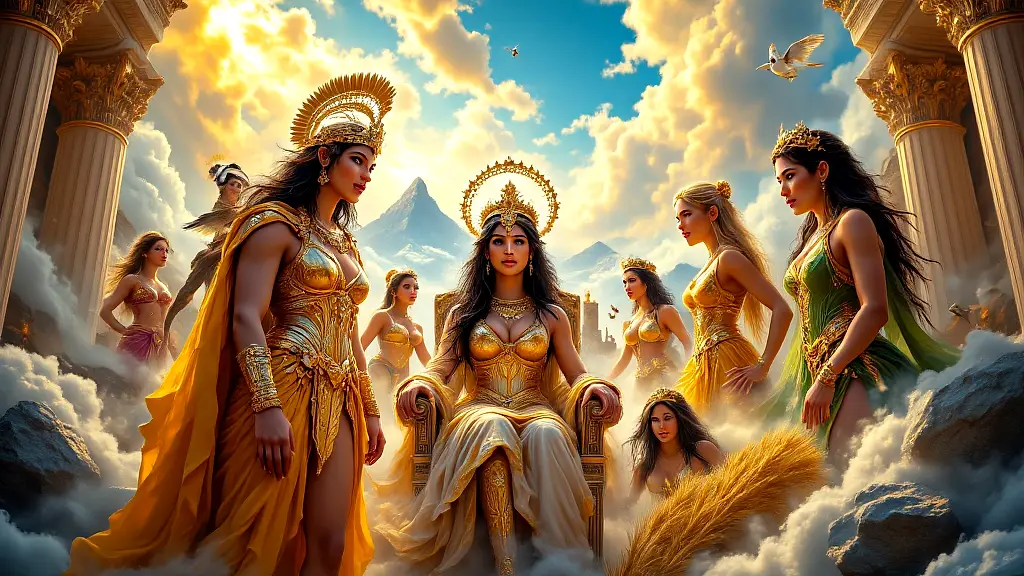
The Olympian goddesses weren’t just symbols – they controlled important parts of Greek life. Athena sprang fully grown from Zeus’s head, already armored. Most stories tell it this way, though some claim she was always his daughter. Her unusual birth showed she ruled both wisdom and war, making her the protector of Athens. She governed both warfare and wisdom, like a general who could also teach philosophy.
Hera was Zeus’s queen, but more importantly the marriage goddess. Despite this sacred role, myths often show her punishing Zeus’s many lovers. People particularly worshipped her in Argos and Samos, where they saw her as their city’s guardian. These goddesses explained how the world worked. Artemis protected wild animals and young girls, showing Greek respect for untamed nature. Her twin Apollo represented civilization’s order.
When Hades took Persephone, her mother Demeter’s grief created winter. Plants grew again each spring when Persephone returned from the Underworld. People often simplify Aphrodite as just the love goddess, but she represented powerful creative forces. Her influence could destroy cities, like when she helped start the Trojan War.
Greeks didn’t just pray to these deities – they saw their power in every harvest, birth, and battle.
Greek goddesses shaped daily life, controlling wisdom, war, nature, and even the seasons through their actions and myths.
Names of Battle and Beauty
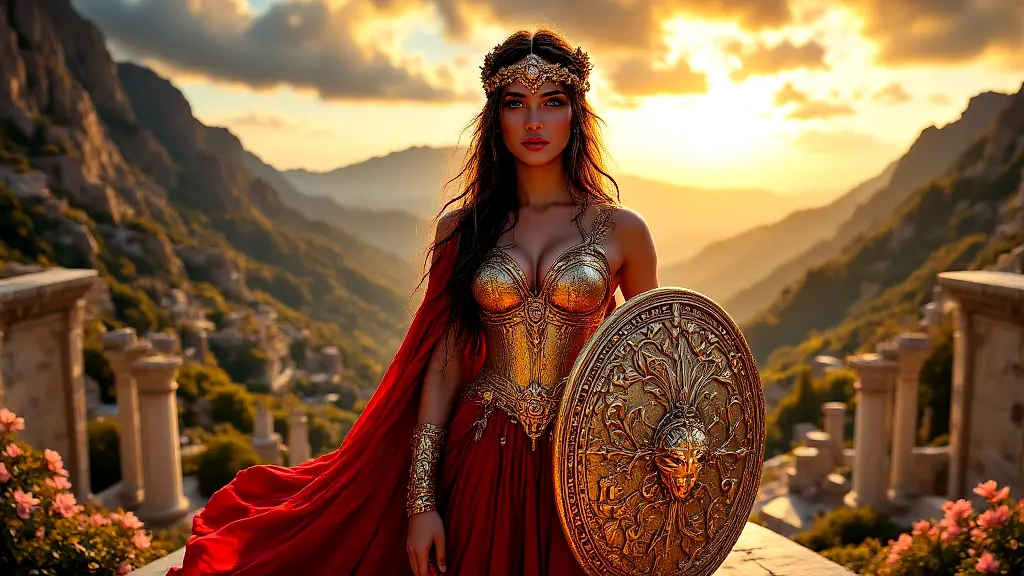
Greek myths give us strong names that show both fighting skill and beauty. These names sound beautiful, but they also have ancient meanings from old stories. Here are some key names that mix war and grace:
- Athena: She ruled strategic warfare and wisdom, unlike Ares who preferred brute force. Crafts also fell under her power.
- Artemis: This goddess remained a virgin while protecting women. Her arrows could bring instant death to enemies.
- Eris: As the strife goddess, she started the Trojan War by tossing the Apple of Discord among the gods.
- Nike: With her wings, this victory goddess followed Zeus into battle.
- Bellona: The Romans worshipped her as war goddess, and Greeks adopted her too. She stood for combat’s raw fury.
- Aphrodite Areia: People in Sparta worshipped this warlike version of the love goddess.
- Enyo: Warriors feared this destruction goddess who earned the title sacker of cities.
- Pallas: Athena got this name after defeating the giant Pallas in battle.
- Hera: The queen of gods helped Greek heroes fight, when she wasn’t punishing Zeus’s lovers.
- Persephone: As underworld queen, her warrior side made people call her “dread Persephone.”
Note: Some goddesses like Aphrodite had peaceful and warlike forms depending on where people worshipped them.
30 Heroines and Mortal Legends
Greek myths aren’t only about gods – regular women were just as important in these ancient tales. From women who suffered to those who fought back, they showed bravery, love, and strength against gods and fate. Here are 30 famous mortal women from Greek stories:
- Penelope – Odysseus’s faithful wife who tricked her suitors for two decades
- Andromache – Hector’s loyal wife who suffered greatly in the Trojan War
- Arachne – A weaver so good she challenged Athena and got changed into a spider
- Alcestis – Chose to die so her husband Admetus could live
- Antigone – Broke the law to give her brother a proper burial
- Medea – Helped Jason get the Golden Fleece, then killed their kids for revenge
- Cassandra – Could see the future but nobody ever believed her warnings
- Iphigenia – Nearly sacrificed by her father Agamemnon to get good winds for war
- Helen of Troy – Her beauty started the famous war between Greeks and Trojans
- Clytemnestra – Murdered her husband Agamemnon when he came home from war
- Electra – Made sure her mother paid for killing her father
- Phaedra – Fell in love with her stepson, which ended badly for both
- Ariadne – Helped Theseus escape the Labyrinth but got left on an island
- Psyche – Went through impossible tests to be with Eros forever
- Danaë – Zeus visited her as golden rain while she was locked in a bronze room
- Europa – Zeus took her while disguised as a bull, giving Europe its name
- Io – Turned into a cow by Zeus to hide her from Hera
- Leda – Had Helen and Clytemnestra after Zeus came to her as a swan
- Semele – Died seeing Zeus’s true form while pregnant with Dionysus
- Niobe – Bragged too much about her kids and lost them all
- Pandora – Opened the famous jar that released all troubles
- Deianira – Accidentally killed Herakles with what she thought was love magic
- Atalanta – The fastest runner who didn’t want to marry anyone
- Lysistrata – Organized the famous sex strike to stop a war
- Polyxena – Killed at Achilles’s grave as an offering
- Hecuba – Lost nearly everything as queen of fallen Troy
- Creusa – Jason left her, then she married Aeneas
- Laodamia – Couldn’t live without her husband and joined him in death
- Chryseis – Her capture caused the fight between Agamemnon and Achilles
- Briseis – Taken from Achilles, which made him refuse to fight
Note: Some women like Helen appear in different stories as either fully human or part-goddess.
Heartbreaking Stories and Great Victories

Andromache’s story reveals war’s terrible impact on women. In the Iliad, she loses her husband Hector, father Eetion, and seven brothers to Achilles’s spear. The worst part comes when she begs Hector not to fight, which sadly predicted what would happen to their son. After Troy fell, Greeks threw the boy from Troy’s walls. Yet Andromache lived, showing how Trojans survived.
Later stories say she became Neoptolemus’s slave, then married Helenus and helped rebuild Troy. Her story changes from mourning wife to someone preserving her culture. Arachne’s tale warns against competing with gods but also shows how much she cared about her craft. This weaver from Lydia said she was better than Athena.
When Athena heard this challenge, she came disguised as an old woman to test her. Their weaving contest produced amazing work – Athena showed the gods’ greatness while Arachne showed the gods behaving badly in clear detail. Though Athena destroyed Arachne’s tapestry, the mortal’s skill was obvious. Athena changed her into a spider, letting her weave forever.
Some versions say Arachne hanged herself first, with Athena taking mercy. Either way, it shows what happens when humans challenge gods but also keep creating. Alcestis chose to die for her husband Admetus, showing perfect Greek marriage loyalty. When Admetus was supposed to die, Apollo said someone else could take his place. Only Alcestis agreed, honoring guest-friendship by keeping her husband’s promise to the god.
In Euripides’s play, she makes him promise to care for their children before she dies. Most stories say Heracles fought Death to bring her back, though experts argue whether this was the original ending. Unlike Persephone who returns yearly, Alcestis came back just once, making her special between human and divine worlds.
Queens and Seers
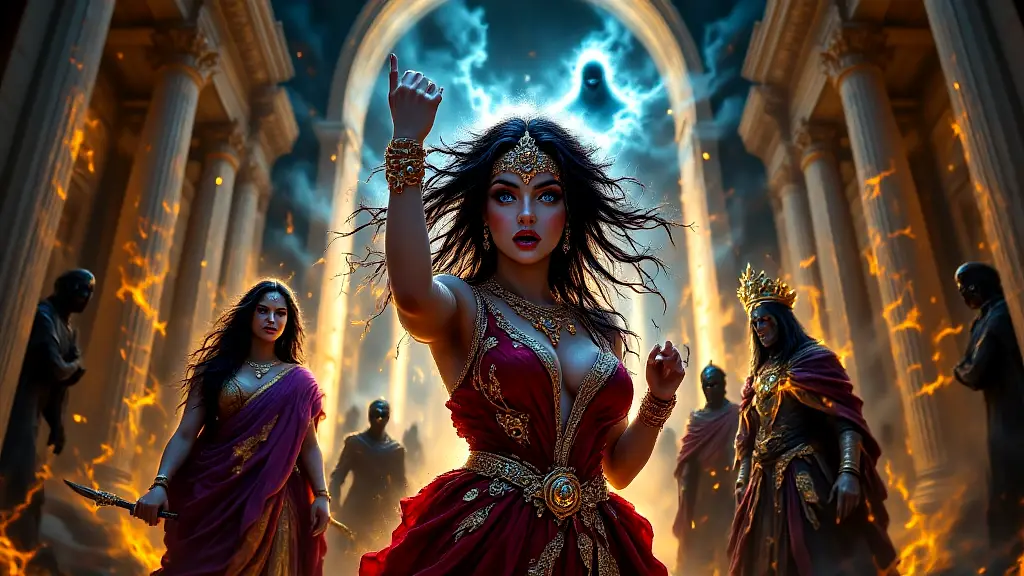
Greek myths show royal women and prophetesses who used power in surprising ways. These women stood in special positions where human power met the gods’ plans. Their stories show what Greeks thought about women in charge, and the problem of seeing the future but not changing it. Here are the most important queens and seers:
| Name | Role | Fate |
|---|---|---|
| Cassandra | Trojan princess and seer | Apollo cursed her to know the truth but nobody believed her after she refused him; Agamemnon took her as his prisoner |
| Medea | Colchian princess and witch | Helped Jason get the Golden Fleece; killed their children when he left her |
| Hecuba | Queen of Troy | Saw Troy’s fall; some stories say she turned into a dog |
| Clytemnestra | Mycenaean queen | Killed her husband Agamemnon; her son Orestes killed her in return |
| Theano | Trojan priestess of Athena | Lived through the war; became an example of pious womanhood |
| Manto | Theban prophetess | Started a new oracle at Claros when Thebes was destroyed |
Note: Some versions say Cassandra broke a promise to Apollo, while others say he just punished her for refusing him.
20 Nymphs and Nature Spirits
Greek mythology describes nymphs as spirits that represented nature. Stronger than humans but weaker than gods, they guarded springs, trees, mountains and parts of the ocean. These nymphs show up in many stories as gods’ lovers, Artemis’s companions, or targets of gods’ and humans’ desires. Here are 20 important nymphs:
- Daphne – Turned into a laurel tree to escape Apollo chasing her
- Echo – Could only repeat others’ words after distracting Hera from Zeus
- Callisto – One of Artemis’s followers that Zeus turned into a bear
- Calypso – Kept Odysseus trapped on her island Ogygia for years
- Thetis – Achilles’s mother who made him invulnerable by dipping him in the river Styx
- Arethusa – Escaped to Sicily where she became a sacred spring
- Syrinx – Changed into river reeds while running from Pan
- Clytie – Loved Helios and wasted away, becoming a sunflower
- Pitys – Became a pine tree to escape Boreas chasing her
- Leuce – Hades’s lover who turned into the white poplar tree
- Minthe – Persephone changed her into mint for loving Hades
- Dryope – Accidentally picked magic flowers and became a black poplar
- Aegle – The most beautiful nymph among the Hesperides
- Clymene – Ocean nymph who was mother to Prometheus and Atlas
- Metis – Zeus swallowed this wise ocean nymph when she was pregnant
- Eurydice – Her death made Orpheus try to bring her back from Hades
- Idyia – Knew many things and gave birth to Medea
- Nomia – Blinded Daphnis when he was unfaithful to her
- Creneis – Nymph connected to the famous spring at Thebes
- Oenone – Could have healed Paris’s deadly wound but chose not to
Note: Some nymphs like Thetis were almost goddesses, while others only protected small areas. Their lives depended on their natural homes – a tree nymph died if her tree died.
Nymphs: Protectors of Nature

Greek mythology sorted nymphs into different groups based on where they lived, forming a system where every natural place had its guardian. Dryads protected trees, with hamadryads being special because each one lived inside a single oak tree. Naiads watched over freshwater springs, while Oceanids guarded the edges of the sea – Hesiod wrote there were over 3,000 of them.
These spirits didn’t live forever like the main gods, but they stayed alive for extremely long times connected to their homes. Think of them like nature’s caretakers, keeping their areas in order though they sometimes met gods and humans. Their half-god status meant they might help others strongly or end up suffering when gods’ plans affected nature. The story of Daphne shows how nymphs protected nature and how they could be in danger.
When Apollo chased this tree nymph who didn’t want him, she asked Gaia for help and changed into the first laurel tree – its leaves later became his sacred plant. Other Greek stories tell similar things: Arethusa became a spring in Sicily while running from the river god Alpheus, and Syrinx turned into hollow reeds to escape Pan, which he then made into his panpipes.
These changes weren’t just ways to run away, but meant the nymphs stayed forever as part of the land. Some versions say Daphne chose to join with nature instead of being caught, showing nymphs’ final way to keep themselves safe by changing form.
Different areas had their own ideas – Arcadians said Daphne was a mountain nymph, Thessalians said she became a pine – but everyone agreed these spirits actually became what they guarded.
Nymphs in Greek mythology were nature spirits tied to specific places like trees, springs, or seas, often transforming into natural features to escape danger or merge with their surroundings.
Names Inspired by the Wild

Greek mythology has many names that came from beautiful parts of nature. These weren’t just words – they directly described what they meant, similar to how we use names like Rose today. Greeks believed gods lived in every stream and forest, and their names showed how important nature was to them. Here are some powerful names from mythology:
- Daphne (Δάφνη): Means “laurel.” The nymph made this name famous when she turned into Apollo’s sacred tree
- Callirhoe (Καλλιρόη): Translates to “beautiful flow.” Several spring nymphs and Oceanus’s daughter had this name
- Echo (Ηχώ): The mountain nymph who could only repeat what others said
- Chloris (Χλωρίς): Stands for “green shoots.” Romans later called her Flora
- Clytie (Κλυτίη): Means “famous one.” This ocean nymph changed into a sunflower
- Aura (Αὔρα): Refers to the “breeze.” She was the Titaness of morning winds
- Rhodope (Ῥοδόπη): Means “Rosy-faced.” This nymph’s name makes people think of sunset colors
Note: Some names like Daphne belonged to different nymphs in various places, proving how much Greeks loved nature names.
25 Titans and Primordial Deities
Before the Olympian gods took over, the Titans and first gods controlled everything. These old gods stood for basic forces of nature and what made up everything that exists. Unlike the Olympians who acted like people, many Titans stood for ideas like time and space.
Their myths show us how the world became organized from disorder, and how the Olympians won power in the war called the Titanomachy.
- Chaos (Χάος): The empty nothingness that existed first
- Gaia (Γαῖα): The earth itself, mother of Titans and Olympians
- Uranus (Οὐρανός): God of the sky and Gaia’s husband
- Tartarus (Τάρταρος): Deep pit below the underworld, used as a jail
- Eros (Ἔρως): The original force that makes things come together
- Erebus (Ἔρεβος): Pure darkness personified
- Nyx (Νύξ): Goddess of night who had many children
- Aether (Αἰθήρ): The clean air gods breathe
- Hemera (Ἡμέρα): Daytime, the opposite of Nyx
- Okeanos (Ὠκεανός): Titan of the world-encircling river
- Coeus (Κοῖος): Titan of thinking and the sky’s axis
- Crius (Κρεῖος): Titan who controlled star patterns
- Hyperion (Ὑπερίων): Titan of light and being watchful
- Iapetus (Ἰαπετός): Titan connected to death and making things
- Theia (Θεία): Titaness of vision and bright light
- Rhea (Ῥέα): Mother of Olympians and Titan queen
- Themis (Θέμις): Titaness of rules and justice
- Mnemosyne (Μνημοσύνη): Titaness who controlled memory
- Phoebe (Φοίβη): Titaness who could see the future
- Tethys (Τηθύς): Titaness of rivers and lakes
- Cronus (Κρόνος): Lead Titan who defeated Uranus
- Atlas (Ἄτλας): Titan forced to hold the sky forever
- Prometheus (Προμηθεύς): Titan who created mankind
- Epimetheus (Ἐπιμηθεύς): Titan known for thinking too late
- Helios (Ἥλιος): Titan driving the sun chariot (sometimes Olympian)
Note: Some stories disagree about gods like Helios being Titans or Olympians. Other old traditions include more first gods not listed here.
The First Gods: Creators of the World

The Titans weren’t just gods – they were the ones who built everything. According to Hesiod’s Theogony, these first beings came from Chaos and set up the basic parts of the world: Gaia became the earth, Uranus the starry sky, and Okeanos the world-encircling river.
Unlike the Olympians who ruled certain areas, the Titans stood for huge natural powers – Themis meant divine law while Mnemosyne was memory itself. They made the blueprint for how things would work, similar to how a building’s skeleton decides what it will look like.
This original family of gods worked on a huge level, and their connections actually formed the world – when Uranus (Sky) joined with Gaia (Earth), they made mountains, seas, and later the Titans who would defeat them. Some Titans were especially important in the change to Olympian rule.
Rhea, called the mother of gods, tricked her husband Cronus by hiding Zeus and giving him a stone she wrapped to look like a baby. Phoebe, whose name means “bright,” controlled the first oracle at Delphi before she gave it to Apollo later – we still see this in names like “Phoebus Apollo.” The Titanomachy, the ten-year war between Titans and Olympians, wasn’t just family fighting but a cosmic restructuring.
Surprisingly, some Titans like Themis and Prometheus helped Zeus, showing this was more about making a new system than right versus wrong. Different areas tell different stories – some say certain Titans went to Tartarus while others like Mnemosyne stayed on Olympus.
All versions agree on one thing: these first gods didn’t vanish completely – what they were stayed as the base for the Greek world that came after.
Timeless Names
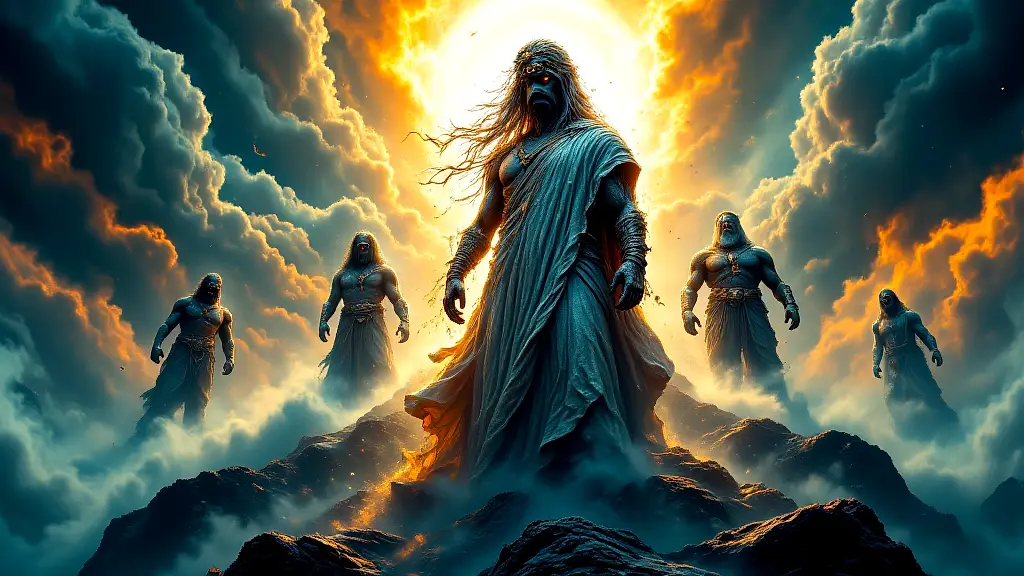
The Titans gave us names that have lasted thousands of years, each with deep meanings that show their beginnings in mythology. These aren’t just old words – they’re names that preserve what ancient forces meant. Just as the Titans formed the world, their names still affect what we call people today, giving strong names that link people to basic parts of life. Here are some classic Titan names with their histories:
- Theia (Θεία, THAY-ah): Means “divine light.” She was the Titaness of sight and the shining upper air
- Metis (Μῆτις, MAY-tees): Stands for “wisdom.” This ocean Titaness represented clever thinking
- Hyperion (Ὑπερίων, hy-PEH-ree-on): Translates to “the high one.” He controlled heavenly light
- Phoebe (Φοίβη, FOY-bay): Means “bright.” She was the original oracle of Delphi
- Rhea (Ῥέα, RAY-ah): Either “flow” or “ease.” She was the Mother of Olympians
- Coeus (Κοῖος, KOY-os): Refers to “inquiry.” This Titan governed intelligence
- Themis (Θέμις, THEH-mees): Means “divine law.” She was the personification of justice
- Cronus (Κρόνος, KROH-nos): Stands for “time.” He led the Titans (people sometimes mix him up with Chronos)
- Mnemosyne (Μνημοσύνη, mnay-MOS-ee-nay): Means “memory.” She gave birth to the Muses
Note: Several characters had names like “Metis” in different myths, proving these important ideas appeared in various ways across Greek stories.
33 Lesser-Known Figures
Greek mythology has many interesting but forgotten figures that fill out the stories. These lesser gods and spirits stand for specific things, local traditions, and special parts of Greek daily life. They might not be as famous as Zeus or Athena, but they give us interesting looks at many different Greek beliefs and how they stood for natural things.
- Achelois (Ἀχελωΐς): Minor moon goddess whose name means “she who washes away pain”
- Aegle (Αἴγλη): Means “radiance.” She was one of the Heliades and goddess of good health
- Aergia (Ἀεργία): Stood for laziness and doing nothing
- Aletheia (Ἀλήθεια): Spirit of truth and being sincere
- Amphictyonis (Ἀμφικτυονίς): Goddess of wine and friendship between countries
- Anteros (Ἀντέρως): God of returned love who punished those with unrequited love
- Apatheia (Ἀπάθεια): Represented not caring and being emotionless
- Astraea (Ἀστραία): Virgin goddess of justice who left earth when the Iron Age came
- Auxo (Αὐξώ): One of the Horae who controlled plants growing in spring
- Bia (Βία): Stood for pure strength and energy
- Brizo (Βριζώ): Local goddess on Delos who protected sailors and dreams
- Ceraon (Κεραών): Minor god of lightning and bad weather
- Chrysothemis (Χρυσόθεμις): She carried the “golden custom” and was like a muse
- Dysnomia (Δυσνομία): Spirit of breaking laws and social chaos
- Eiar (Εἰαρ): Stood for the season of spring
- Elpis (Ἐλπίς): The spirit that represented hope
- Eunomia (Εὐνομία): Goddess of keeping order and following laws
- Eupheme (Εὐφήμη): Spirit of cheering, praise, and victory shouts
- Euthenia (Εὐθενία): Stood for being wealthy and having plenty
- Geras (Γῆρας): God of growing old
- Hedone (Ἡδονή): Stood for feeling pleasure and enjoyment
- Hegemone (Ἡγεμόνη): Leader of the Graces in Athens
- Herse (Ἕρση): Athenian goddess of morning dew
- Homados (Ὅμαδος): Stood for the noise of battle
- Horcus (Ὅρκος): Spirit who watched over promises and oaths
- Iaso (Ἰασώ): Goddess who helped people recover from sickness
- Kakia (Κακία): Stood for being morally bad and vicious
- Ktesios (Κτήσιος): Protective spirit of food storage in homes
- Limos (Λιμός): Male spirit of hunger and not having food
- Methe (Μέθη): Stood for being drunk on wine
- Oizys (Ὀϊζύς): Spirit of sadness and suffering
- Phthonus (Φθόνος): Stood for feeling jealous and envious
- Soteria (Σωτηρία): Goddess of safety and being saved from danger
Note: Many of these gods only appeared in certain areas or local traditions, proving how varied Greek religion was beyond just the main Olympian gods.
Hidden Stories Worth Discovering

Beyond the well-known Olympian gods and heroes exists a collection of forgotten stories that show us unexpected things about ancient Greek beliefs. These lesser-known myths frequently show parts of everyday life, natural events, and human feelings that the famous stories don’t cover. Similar to finding hidden spaces, these overlooked narratives demonstrate different sides of Greek thinking, including how they understood sleep problems and why some plants had special significance.
Take Melinoe, Persephone’s mysterious daughter who controlled ghosts and bad dreams. The Orphic tradition says Zeus disguised himself as Hades to father her with Persephone, which made her appear half in light, half in shadow. Then there’s Britomartis, the Cretan sweet maiden who ran from King Minos and later joined Artemis as a hunter – her tale mainly survives in Crete’s local traditions.
The story of Phaedra, Ariadne’s sister, became a cautionary tale about forbidden love when she fell for her stepson Hippolytus. Euripides kept her story in his plays, though more famous tragedies often overshadow it. These stories interest us because they show specific concerns of Greek communities. The Aloadai twins attempted to attack Olympus by stacking mountains, possibly explaining certain rock formations.
Local nymphs like the Leimenides guarded harbors that were vital to particular cities. Even minor gods like Eileithyia, who oversaw childbirth, were vitally important to ordinary people despite rarely appearing in major myths. These hidden stories prove Greek mythology wasn’t just about gods fighting – it was a practical tradition that helped people make sense of their world.
Overlooked Treasures
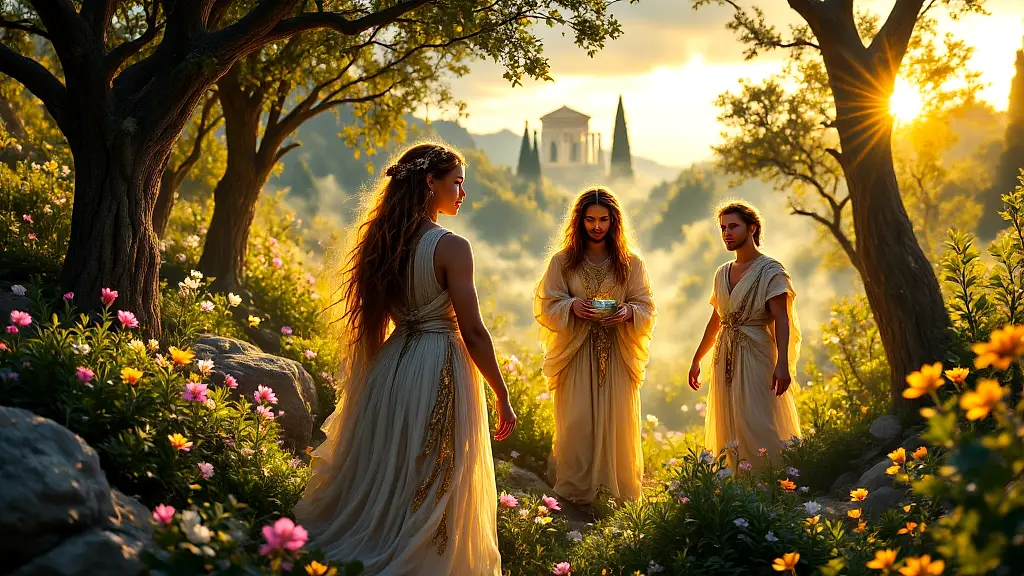
Greek mythology has many interesting but rarely talked about gods who controlled particular things in nature and human life. These minor deities stood for things that mattered in everyday life, though they weren’t important enough for Olympian rank. They add depth to the stories, similar to background characters. Here are some especially noteworthy examples:
| Name (Greek) | What They Controlled | Background Story | Special Features |
|---|---|---|---|
| Alectrona (Ἀλεκτρονα) | Morning/Sunrise | Possibly a daughter of Helios, people worshipped her in Rhodes | Linked to roosters (alektor) and dawn |
| Amphictyonis (Ἀμφικτυονίς) | Wine and Friendship | Protected the Amphictyonic League of Greek tribes | First to mix wine with water |
| Eunostos (Εὔνοστος) | Flour Mills | Boeotian fertility spirit | Guarded grain processing |
| Oenotropae (Οἰνοτρόπαι) | Wine Transformation | Daughters of Anius who could change things into wine | They appeared in stories about the Trojan War |
| Pandeia (Πανδεια) | Full Moon | Some texts say she was Zeus and Selene’s child | She may have represented the moon’s glow |
| Philophrosyne (Φιλοφροσύνη) | Welcome and Hospitality | Considered one of the Graces in some areas | Stood for friendly welcomes |
| Sosipolis (Σωσίπολις) | City Protection | Child-god honored in Elis | Shown as a baby holding a cornucopia |
Note: Some of these gods only appeared in certain areas or partial texts, proving Greek religion differed by location. For instance, Rhodes islanders valued Alectrona, though she doesn’t appear in major Greek myths.
Greek mythology includes lesser-known gods who represented everyday things like sunrise, wine, and flour mills, adding detail to the stories.
20 Names from Epic Tales
The great Greek epics gave us many unforgettable mythological figures whose names we still know today. These characters from Homer’s poems and other ancient stories show the best examples of hero stories, displaying good qualities, weaknesses, and fates that have fascinated people for thousands of years. From the tragic women of Troy to the clever helpers Odysseus met, these names come from important epic stories that influenced European writing.
- Andromache (Ἀνδρομάχη): Hector’s devoted wife in the Iliad
- Briseis (Βρισηΐς): Achilles’ war prize – when Agamemnon took her, it made Achilles furious
- Calypso (Καλυψώ): Nymph who kept Odysseus on her island for seven years
- Circe (Κίρκη): Sorceress who changed men into pigs
- Deidamia (Δηϊδάμεια): Achilles married her secretly on Skyros
- Eurycleia (Εὐρύκλεια): Odysseus’s faithful nurse who recognized him
- Hecuba (Ἑκάβη): The suffering queen of Troy
- Helen (Ἑλένη): Her beauty started the Trojan War
- Iphigenia (Ἰφιγένεια): Agamemnon’s daughter who was sacrificed
- Laodamia (Λαοδάμεια): Protesilaus’s wife who grieved terribly
- Medea (Μήδεια): Powerful witch from the Argonauts’ story
- Nausicaa (Ναυσικάα): Princess who helped Odysseus when he washed ashore
- Penelope (Πηνελόπη): Odysseus’s wife who waited faithfully
- Polyxena (Πολυξένη): Priam’s daughter who was killed as an offering
- Pandora (Πανδώρα): The first woman in Hesiod’s stories
- Scylla (Σκύλλα): Dangerous monster Odysseus faced at sea
- Thetis (Θέτις): A sea nymph and Achilles’ mother
- Xenia (Ξενία): The spirit of hospitality rules
- Ariadne (Ἀριάδνη): She helped Theseus escape the Labyrinth
- Cassandra (Κασσάνδρα): Prophetess from Troy with a curse no one believed
Note: These names from epic poems usually have special meanings behind them – Andromache means “man’s battle,” matching her war experiences, while Nausicaa’s name means “ship burner,” which strangely predicted what happened to the Phaeacians after helping Odysseus.
Legendary Women from Poetry and Song

Penelope, the faithful wife from The Odyssey, shows remarkable cleverness that matches her husband’s well-known intelligence. While Odysseus traveled for twenty years, she protected his kingdom through her clever trick of unweaving – each night she undid her burial shroud to avoid choosing a new husband (Odyssey 2.93-110).
Her final test with the bow (Odyssey 21) matches Odysseus’s challenges, showing she actively protected their marriage with careful strategy. She showed strategic thinking similar to expert planning, appearing to follow rules while secretly controlling the situation. The nine Muses embody the ancient Greeks’ idea of divine inspiration, each overseeing different arts from epic poetry (Calliope) to astronomy (Urania).
Hesiod wrote that they “gave me a godlike voice” (Theogony 31-32), revealing how artists believed their work came from the gods. Differing from today’s idea of individual talent, Greek creators saw themselves as channels for these daughters of Zeus and Memory. Their influence reached beyond art – historians like Herodotus called on them for accuracy, suggesting truth itself required godly inspiration.
Names from the Great Epics

Greek epic poems gave Western stories important ways of naming characters, where each name had special significance. These weren’t just labels but important clues – like how “Odysseus” connects to the word for suffering pain, which hinted at his difficult travels, or how “Achilles” might come from the word for grief. Here are meaningful names from epic poems that represent human experiences still important today:
- Calypso (Καλυψώ): Odyssey nymph meaning “she who conceals” (Odyssey 5)
- Briseis (Βρισηΐς): Achilles’s war prize meaning “daughter of Briseus” (Iliad 1)
- Clio (Κλειώ): Muse of history, from the word for glory (Theogony 77)
- Andromache (Ἀνδρομάχη): Means “battle of a man,” Hector’s loyal wife (Iliad 6)
- Circe (Κίρκη): Enchantress whose name might mean “falcon” (Odyssey 10)
- Pandarus (Πάνδαρος): Trojan archer whose name suggests “all-gift” (Iliad 4)
- Medea (Μήδεια): “Cunning one,” Jason’s sorceress wife (Argonautica 3)
- Telemachus (Τηλέμαχος): Means “far-fighter,” Odysseus’s son (Odyssey 1)
- Cassandra (Κασσάνδρα): “She who entangles men,” prophetess who received a curse (Iliad 13)
- Patroclus (Πάτροκλος): “Glory of the father,” Achilles’s close companion (Iliad 16)
Note: Names like Briseis show how ancient Greeks named women after their fathers, since she’s called “daughter of Briseus.” Scholars still argue about exact meanings for names like Circe.
FAQs
1. Are Greek mythology names culturally appropriate today?
Greek mythology names are culturally appropriate today, as they have been widely adopted across cultures without religious or historical restrictions.
2. What are the most powerful goddess names?
The most powerful goddess names stem from deities like Athena, Hera, and Hecate, embodying wisdom, sovereignty, and magic.
3. Do these names have modern nicknames?
Modern nicknames for Greek mythology names do exist, such as “Sephie” for Persephone or “Thea” for Althea.
4. How do I pronounce ancient Greek names?
Pronouncing ancient Greek names often follows reconstructed Classical or modern Greek phonetics, with emphasis on vowel clarity and syllable stress.



